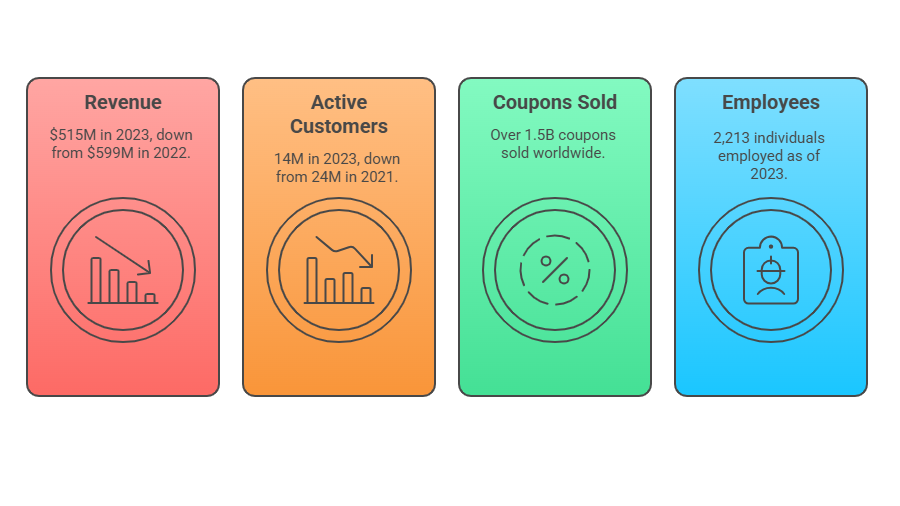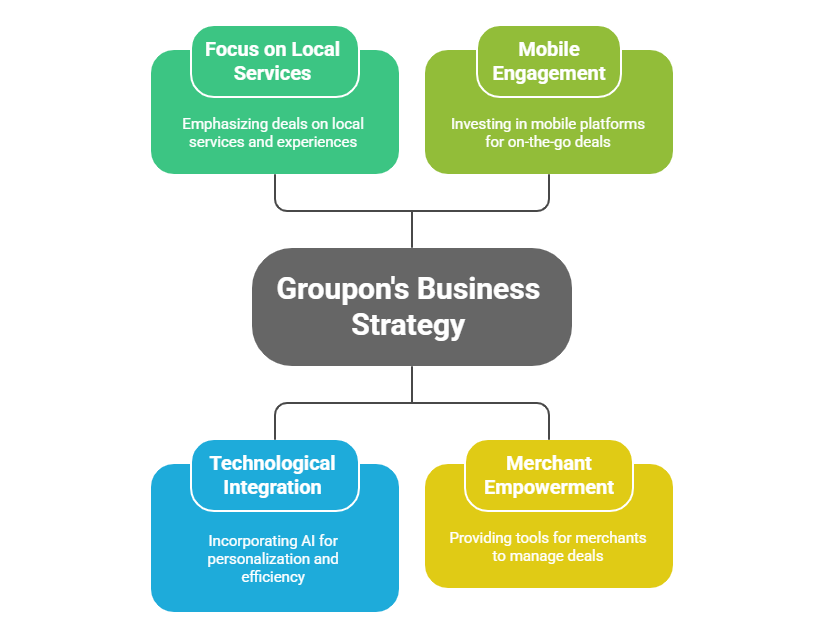Groupon, once a trailblazer in the daily deals industry, has evolved significantly since its inception in 2008. Initially celebrated for its innovative approach to local commerce, the company now operates as a global e-commerce marketplace, connecting consumers with local merchants through discounted offers on activities, travel, goods, and services. To fully appreciate Groupon business model, it’s essential to examine key metrics that highlight its performance and strategic direction.
Key Metrics of Groupon (2023–2025) #

Before delving into the Groupon business model, let’s review some of the company’s critical metrics:
- Revenue: In 2023, Groupon reported annual revenue of $515 million, a decrease from $599 million in 2022.
- Active Customers: As of 2023, Groupon had approximately 14 million active customers, a decline from 24 million in 2021.
- Coupons Sold: Groupon has sold over 1.5 billion coupons worldwide, showcasing its extensive reach and popularity.
- Employees: The company employed 2,213 individuals as of 2023, reflecting its operational scale.
These figures provide a snapshot of Groupon’s operations and market presence.
Groupon’s Business Model #
Groupon business model centers around its role as a two-sided marketplace, connecting consumers with local merchants through discounted offers. Here’s a breakdown of how this model functions:
1. Deal Discovery and Consumer Engagement #
Consumers access Groupon’s platform via its website or mobile app to discover daily deals on various products and services. The platform’s user-friendly interface and personalized recommendations enhance customer engagement, encouraging repeat visits and purchases.
2. Merchant Partnerships #
Merchants partner with Groupon to promote their offerings to a broader audience. Groupon provides tools for businesses to create and manage deals, track performance, and engage directly with customers.
3. Revenue Generation #
Groupon generates revenue through:
- Transaction Fees: Groupon takes a commission on each sale made through its platform. The standard revenue split has traditionally been 50/50 between Groupon and the merchant, though this can vary based on the deal’s specifics.
- Promotional Fees: Merchants can pay additional fees to enhance the visibility of their deals, reaching a larger audience.
- Advertising: Groupon also earns revenue through advertising partnerships and featured placements on its platform.
4. Global Reach and Market Segmentation #
Groupon operates in 13 countries, tailoring its offerings to local markets. The company has shifted its focus from physical goods to local services, experiences, and activities, aligning with consumer preferences for unique and personalized experiences.
Groupon’s Revenue Model #
Groupon revenue model is multifaceted, incorporating various streams to sustain its business operations:
- Local Services: Deals on dining, beauty, health and wellness, fitness, automotive, and home services.
- Travel and Getaways: Discounts on vacation packages, hotel stays, and travel experiences.
- Goods: Although less emphasized, Groupon still offers physical products through its platform.
- Advertising and Promotions: Revenue from merchants seeking enhanced visibility and targeted marketing.
This diversified approach allows Groupon to mitigate risks associated with market fluctuations in any single category.
Groupon’s Business Strategy #

To adapt to changing market dynamics and consumer behaviors, Groupon has implemented several strategic initiatives:
- Focus on Local Services: Emphasizing deals on local services and experiences to cater to consumer demand for unique and personalized offerings.
- Technological Integration: Incorporating artificial intelligence to enhance personalization, search relevance, and dynamic pricing. AI also automates customer support and analyzes campaign performance to boost efficiency and conversion rates.
- Mobile Engagement: Investing in mobile platforms to facilitate on-the-go deal discovery and redemption, aligning with the increasing use of smartphones for online shopping.
- Merchant Empowerment: Providing merchants with self-service tools to create, manage, and track deals independently, fostering a more dynamic partnership.
These strategies aim to strengthen Groupon’s position in the competitive e-commerce marketplace.
How Does Groupon Make Money? #
Groupon’s revenue generation is primarily driven by its marketplace model, where it acts as an intermediary between consumers and merchants. The company earns by:
- Commission on Sales: A percentage of each transaction made through its platform.
- Promotional Fees: Additional charges for merchants seeking enhanced visibility.
- Advertising Revenue: Earnings from featured placements and advertising partnerships.
By diversifying its revenue streams and focusing on high-demand categories, Groupon aims to maintain profitability and growth.
Why Affiliates Should Build a Groupon-like Platform #
- Tap into the local deals market: Connect consumers with local businesses offering discounts on products, services, and experiences.
- Earn recurring revenue: Generate consistent income through commissions on each sale without needing inventory or warehousing.
- Low initial investment: Start with minimal upfront costs by curating deals from third-party merchants.
- Personalized offers: Use customer data to tailor deals, boosting conversion rates and customer retention.
- Mobile commerce opportunity: Leverage the increasing trend of mobile shopping with a mobile-optimized platform.
- Strategic partnerships: Form alliances with other brands or platforms to expand reach and enhance customer offerings.
- Scalability: Easily grow the platform by adding more deals, merchants, and features as the business expands.
Build your own Groupon Like Platform with EnactSoft #
- 500+ successful affiliate projects: We are the only company with extensive experience in building custom affiliate platforms for businesses worldwide.
- Proven expertise: Our team has helped clients launch scalable affiliate marketing platforms and drive revenue, including CouponAE, which expanded to 13 countries in just 7 days.
- AI-driven solutions: We build scalable, AI-powered platforms that deliver personalized, targeted offers to your customers.
- Custom integrations: From API integrations to seamless merchant onboarding, we have the technical expertise to bring your platform to life.
- End-to-end support: We offer complete solutions, from platform design to deployment, ensuring a seamless experience for both merchants and customers.
EnactSoft is here to help you build a Groupon-like platform that generates recurring revenue and scales with ease.
Reach out today to leverage our expertise and start building your successful coupon platform!
Conclusion #
Groupon business model has evolved from a daily deals platform to a comprehensive e-commerce marketplace. By focusing on local services, integrating advanced technologies, and empowering merchants, Groupon continues to adapt to the ever-changing digital landscape. Understanding these facets provides insight into how Groupon operates and generates revenue in today’s competitive market.
FAQ’s #
Is Groupon a profitable company? #
Groupon has struggled with consistent profitability, facing challenges like high marketing costs and customer retention. However, it’s working to optimize its business model for better profitability through strategic shifts.
How does Groupon make money? #
Groupon generates revenue through commissions on deals sold, promotional fees from merchants for enhanced visibility, and advertising services, taking a percentage of each transaction between consumers and businesses.
What is Groupon business model? #
Groupon operates as a marketplace connecting consumers with local merchants, offering discounted deals across various categories. It earns money by taking a commission from each transaction made through its platform.
How does Groupon attract customers? #
Groupon attracts customers through targeted email campaigns, digital marketing, and personalized deal recommendations. Time-limited offers and discounts create urgency, encouraging repeat purchases and increasing engagement with the platform.
What are the risks of starting a Groupon-like platform? #
Risks include merchant dissatisfaction with discounting, customer churn, and difficulty in maintaining profitability due to competition. However, with the right strategy and tech, these risks can be mitigated successfully.



